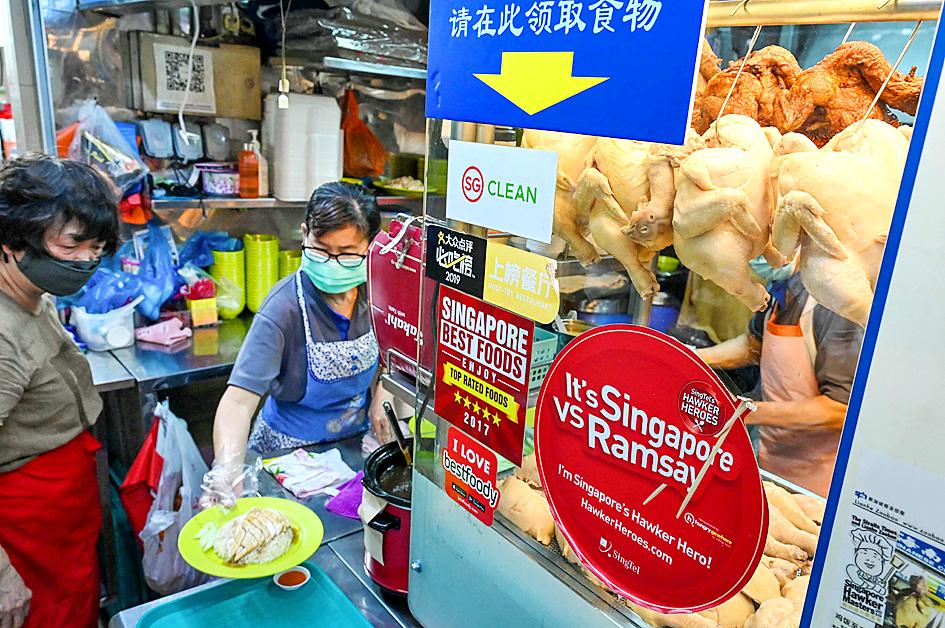Malaysia will stop exporting chickens from today in a protectionist move to bolster domestic food supply, sparking distress in neighboring Singapore where chicken rice is a national dish.
Malaysian Prime Minister Ismail Sabri Yaakob announced last week that, beginning today, Malaysia will ban exports of 3.6 million chickens a month until domestic prices and production stabilize.
The move is felt most in Singapore, which sources one-third of its poultry from Malaysia.

Photo: AFP
Almost all the chickens are imported live to Singapore, where they are slaughtered and chilled. Singaporean consumers have been rushing to stock up on fresh chicken ahead of the ban, with local media reporting that shelves in some wet markets and supermarkets have been cleared of poultry.
The Singapore Straits Times said chicken sellers predicted the cost of chilled chicken could rise by up to 30 percent, sending chicken dish prices soaring.
The Singaporean government has urged consumers to switch to frozen chicken and other alternative meats, and is exploring new markets for fresh chicken.
However, there is concern over the fate of the ubiquitous chicken rice that is sold everywhere from hawker stalls to top hotels. Popular eatery Tian Tian Hainanese Chicken Rice, which gets its poultry entirely from Malaysia, reportedly said it will introduce pork and seafood dishes instead of using frozen chicken if it fails to find new suppliers.
Malaysia’s protectionist move comes as countries worldwide grapple with soaring food prices, fueled partly by the Ukraine war. Ukraine is a major exporter of corn and grains that are key components of chicken feed. India has restricted sugar and wheat exports, while Indonesia temporarily halted — and then lifted — palm oil sales abroad.
Apart from the export ban, Malaysia also abolished import permits for chicken and other foods to boost food supply and curb prices amid public anger. It has earlier capped chicken prices and allocated subsidies for farmers squeezed by rising cost of chicken feed, partly caused by a weakening Malaysian currency.
The export ban came as a surprise by Ismail’s government, which took power in August last year and faces a general election next year. The government is also investigating claims that cartels are controlling the price and supply of chicken.
The ban not only caused alarm in Singapore, but also troubled smaller Malaysian poultry farmers who supply to Singapore to help keep their operations afloat.
The Malaysian government did not say how long the export ban will last, but officials expect supply and prices to normalize within a month.

TAKING STOCK: A Taiwanese cookware firm in Vietnam urged customers to assess inventory or place orders early so shipments can reach the US while tariffs are paused Taiwanese businesses in Vietnam are exploring alternatives after the White House imposed a 46 percent import duty on Vietnamese goods, following US President Donald Trump’s announcement of “reciprocal” tariffs on the US’ trading partners. Lo Shih-liang (羅世良), chairman of Brico Industry Co (裕茂工業), a Taiwanese company that manufactures cast iron cookware and stove components in Vietnam, said that more than 40 percent of his business was tied to the US market, describing the constant US policy shifts as an emotional roller coaster. “I work during the day and stay up all night watching the news. I’ve been following US news until 3am

UNCERTAINTY: Innolux activated a stringent supply chain management mechanism, as it did during the COVID-19 pandemic, to ensure optimal inventory levels for customers Flat-panel display makers AUO Corp (友達) and Innolux Corp (群創) yesterday said that about 12 to 20 percent of their display business is at risk of potential US tariffs and that they would relocate production or shipment destinations to mitigate the levies’ effects. US tariffs would have a direct impact of US$200 million on AUO’s revenue, company chairman Paul Peng (彭雙浪) told reporters on the sidelines of the Touch Taiwan trade show in Taipei yesterday. That would make up about 12 percent of the company’s overall revenue. To cope with the tariff uncertainty, AUO plans to allocate its production to manufacturing facilities in

Six years ago, LVMH’s billionaire CEO Bernard Arnault and US President Donald Trump cut the blue ribbon on a factory in rural Texas that would make designer handbags for Louis Vuitton, one of the world’s best-known luxury brands. However, since the high-profile opening, the factory has faced a host of problems limiting production, 11 former Louis Vuitton employees said. The site has consistently ranked among the worst-performing for Louis Vuitton globally, “significantly” underperforming other facilities, said three former Louis Vuitton workers and a senior industry source, who cited internal rankings shared with staff. The plant’s problems — which have not

COLLABORATION: Given Taiwan’s key position in global supply chains, the US firm is discussing strategies with local partners and clients to deal with global uncertainties Advanced Micro Devices Inc (AMD) yesterday said it is meeting with local ecosystem partners, including Taiwan Semiconductor Manufacturing Co (TSMC, 台積電), to discuss strategies, including long-term manufacturing, to navigate uncertainties such as US tariffs, as Taiwan occupies an important position in global supply chains. AMD chief executive officer Lisa Su (蘇姿丰) told reporters that Taiwan is an important part of the chip designer’s ecosystem and she is discussing with partners and customers in Taiwan to forge strong collaborations on different areas during this critical period. AMD has just become the first artificial-intelligence (AI) server chip customer of TSMC to utilize its advanced